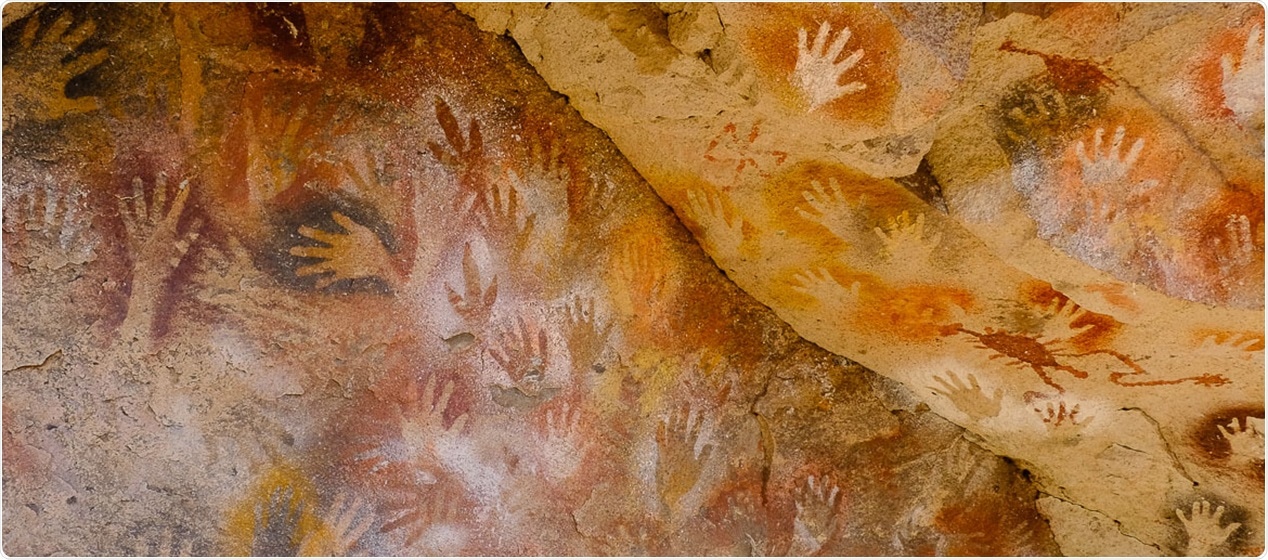As part of a new study, researchers at the Wellcome Sanger Institute, the University of Cambridge, and their colleagues sequenced 929 human genomes and presented the most extensive analysis of human genetic diversity performed so far.

Handprints made by ancient humans in South America. Image Credit: Matt Midgley.
The research unravels an enormous amount of unexplained genetic variation, offering a new understanding of the evolutionary past of humans, emphasizing the complexity of the process through which ancestors diversified, migrated, and mixed through the entire world.
Reported in the Science journal, the study is one of the detailed illustrations of the genetic diversity of worldwide populations done so far.
It is freely accessible to all scientists to examine human genetic diversity, which includes studies on genetic susceptibility to disease in various parts of the world.
According to the consensus perspective of human history, the ancestors of present-day humans evolved from the ancestors of extinct Neanderthal and Denisovan groups about 500,000 to 700,000 years ago before “modern” humans emerged in Africa in the last few hundred thousand years.
Nearly 50,000 to 70,000 years ago, few humans moved out of Africa and then joined with archaic Eurasian groups. Thereafter, populations grew fast, with widespread migration and mixture as several groups transformed from hunter-gatherers to food producers in the past 10,000 years.
For the first time, this study made use of the most advanced high-quality sequencing technology on such a huge and diverse set of humans, covering 929 genomes from 54 geographically, linguistically, and culturally distinct populations from across the world.
With the sequencing and analysis of these genomes, which form part of the Human Genome Diversity Project (HGDP)-CEPH panel, there are now remarkable details about the genetic history of humans.
The researchers identified millions of DNA variations that were previously unknown and restricted to one continental or major geographical region. Although most of them were rare, they included general variations in specific African and Oceanian populations, which had not been found by earlier studies.
Such variations may affect the susceptibility of different populations to disease. But medical genetics studies have primarily been conducted in populations of European ancestry, which implies that any medical consequences to which these variants nay be susceptible are unknown.
Finding these novel variants is a first step toward completely expanding the study of genomics to populations that are not represented so well.
However, the study did not report the presence of any single DNA variation in 100% of genomes from any major geographical region, while it was absent from all other regions. This result highlights the majority of common genetic variations found across the world.
The detail provided by this study allows us to look deeper into human history, particularly inside Africa where less is currently known about the timescale of human evolution. We find that the ancestors of present-day populations diversified through a gradual and complex process mostly during the last 250,000 years, with large amounts of gene flow between these early lineages.”
Dr Anders Bergström, Francis Crick Institute; alumnus of the Wellcome Sanger Institute
Dr. Bergström continued, “But we also see evidence that small parts of human ancestries trace back to groups that diversified much earlier than this.”
The Human Genome Diversity Project resource has facilitated many new discoveries about human history in the past two decades. It is exciting to see that with the latest genomic sequencing technology, these genomes will continue to help us understand our species and how we have evolved.”
Hélène Blanché, Head of the Biological Resource Centre, Centre d’Etude du Polymorphism Human (CEPH) in Paris, France
The study also offers evidence that the Neanderthal ancestry of modern humans can be described by one main “mixing event,” which most likely happened when several Neanderthal individuals mixed with modern humans shortly after the latter had moved out of Africa.
On the contrary, different sets of DNA segments inherited from Denisovans were found in people from Oceania and East Asia, indicating at least two different mixing events.
The discovery of small amounts of Neanderthal DNA in West African people, most probably pointing toward later genetic backflow into Africa from Eurasia, which highlights how human genetic history includes multiple layers of complexity.
To date, it was considered that only people outside sub-Saharan Africa possessed Neanderthal DNA.
Though this resource is just the beginning of many avenues of research, already we can glimpse several tantalizing insights into human history. It will be particularly important for better understanding human evolution in Africa, as well as facilitating medical research for the full diversity of human ancestries.”
Dr Chris Tyler-Smith, Wellcome Sanger Institute
Source:
Journal reference:
Bergström, A., et al. (2020) Insights into human genetic variation and population history from 929 diverse genomes. Science. doi/10.1126/science.aay5012